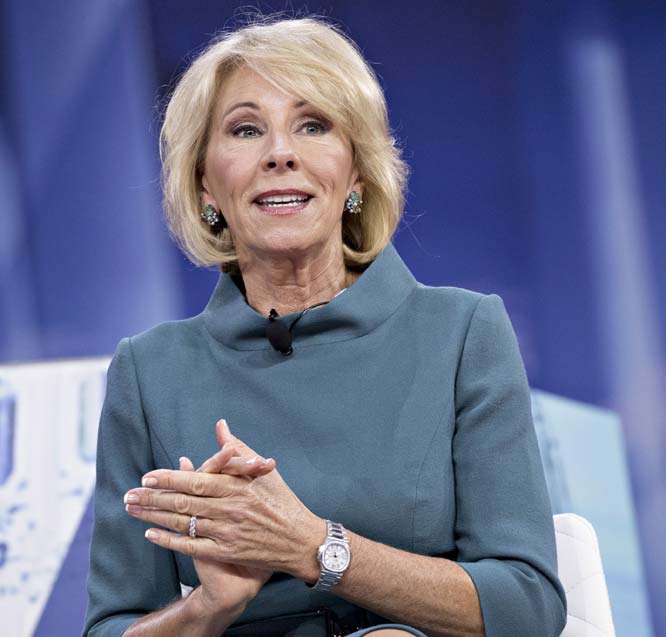 Education Secretary Betsy DeVos. Andrew Harrer for Bloomberg
Education Secretary Betsy DeVos. Andrew Harrer for Bloomberg
WASHINGTON - The group was small but hard to miss with their large posters and matching yellow beanies.
"Hey hey! Ho ho! Period poverty has got to go!" they chanted.
On Monday, 40 students and some adults marched near Education Department headquarters in Washington, calling on Secretary Betsy DeVos to take action to fight what they call "period poverty." Their list of demands included comprehensive period education for students of all genders before age 12 and programs that would equip K-12 school bathrooms with free menstrual products.
Students and activists have pressed for years for school bathrooms to be supplied with menstrual products as part of a national movement for "menstrual equity." It aims to provide access to menstrual products to anyone who needs them, especially those from low-income families.
The Education Department did not immediately respond to a request for comment about the issue.
Students from high schools and colleges across the nation traveled to Washington from New York, where they attended Period Con, a weekend of workshops and panels hosted by Period, the world's largest youth-run nonprofit group working to shatter stigma associated with menstruation. Period provides free menstrual products to those in need.
Period was founded in 2014 by two high school students, Nadya Okamoto and Vincent Forand, and has a few hundred chapters across the country.
Many students said they were inspired to join Period after unfortunate personal experiences with menstruation.
Okamoto, 20, recounted growing up in a low-income household and being dependent on reusable menstrual products. There were times during school, she said, when she would have to use toilet paper or brown paper towels because her school's bathrooms weren't equipped with free menstrual products.
"When you don't have access to period products, you don't talk about it - you just grumble and deal with it," Okamoto told the crowd.
London Vallery, an 18-year-old freshman at Harvard University, heard about the rally after connecting with Okamoto over social media. Vallery recently joined Harvard's Period chapter after learning that period poverty affected rural areas more than urban ones.
Misunderstanding, she said, is one of the largest contributors to period poverty. "We need to spread the word. Once people learn more about period poverty, they will understand menstruation is a health issue, not a luxury," she said.
A 2018 poll sponsored by Always, a company that produces menstrual supplies, found that nearly 1 in 5 girls in the United States have left school early or stayed home because they did not have period products. The menstrual equity campaign aims to help not only women and girls but transgender and nonbinary students.
Monday's rally was organized by Period and United for Access, a new campaign associated with Thinx, a company that makes feminine hygiene products.
Speakers commended the young activists on their achievements. Chloe Knott, 15, and Abby Rice, 18, who lead a Period chapter in Portland, Oregon, persuaded Portland Public Schools to spend $25,000 a year to stock school bathrooms with free menstrual products for students.
Ameer Abdul, 22, and Anusha Singh, 19, led their Period chapter at Ohio State University in pressuring the school to stock bathrooms on campus with free menstrual products. By November, more than 90 campus buildings had access to free menstrual products. The group has also been working with Democratic state Rep. Brigid Kelly on a measure that would eliminate the luxury tax on tampons in Ohio.
Activists are pushing state legislatures to make menstrual products tax-free, given that more than 35 states still tax them.
In the Washington region, Maryland has exempted menstrual products from state taxes since 1980, and late last year, Democratic D.C. Mayor Muriel Bowser announced that the nation's capital would do the same.
Efforts in the Virginia General Assembly to drop taxes on menstrual products have been unsuccessful, although "menstrual cramp relievers" are exempt from state taxes, according to a list of tax-free products, as are laxative preparations, wart removers and oil of wintergreen.
Last year, at Justice High School in Northern Virginia, the chapter of Girl Up, an international club devoted to gender equality, began a campaign to outfit restrooms with menstrual products. A Washington Post story about the effort quoted Jen Golobic, an English teacher at Justice, as saying that students may have avoided asking for sanitary pads from the school clinic because they felt uncomfortable doing so.
"It should just be part of our culture," said Golobic, who sponsors the Girl Up club. "Girls shouldn't have to be embarrassed about something that's just a natural, biological need."
The issue is not confined to the United States; menstrual equity has been a cause in Britain, too, where activists have pushed some schools into providing free menstrual products. A poll published in 2018 in British newspapers, sponsored by a sanitary-pad company, found that 7 percent of girls in Britain missed school during the previous year because they couldn't afford sanitary products. Last year, the government of India scrapped a hefty tax on sanitary napkins.
A United for Access petition has at least 35,000 signatures at the Thinx website.
Activists also took out a full-page ad directed at DeVos.
The ad features a letter sent to DeVos; it was spearheaded by United for Access and Period.
Every weekday JewishWorldReview.com publishes what many in the media and Washington consider "must-reading". Sign up for the daily JWR update. It's free. Just click here.
(COMMENT, BELOW)


 Contact The Editor
Contact The Editor
 Articles By This Author
Articles By This Author